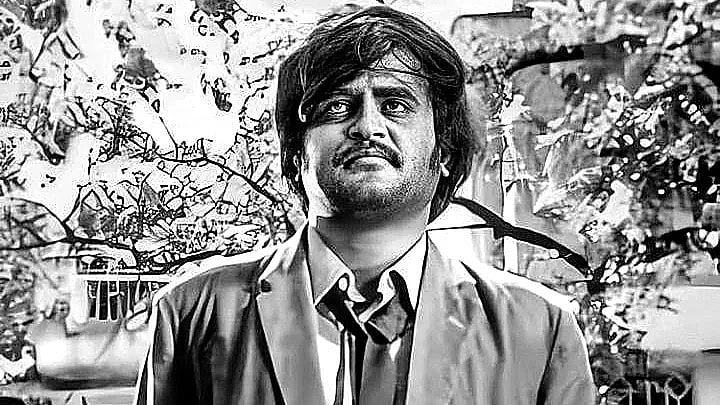
Credit: Special arrangement
In his debut film ‘Apoorva Raagangal’ (1975), directed by his mentor K Balachander, a rugged-looking Rajinikanth, with a stubble and clad in shabby clothes flings, open the gates of a house to meet his estranged wife. That iconic scene marked not just his first appearance on the silver screen, but also set the tone for a career built on style, symbolism, and charisma.
Fifty years later, the doors of Tamil cinema still remain open for the superstar, who enjoys an unparalleled box office success. He boasts of a massive fandom transcending languages and countries — his movies run to packed halls in far-away Japan.
For millions of his fans, Rajinikanth is no mere human; he is a demigod.
Balachander, who saw a spark in Shivaji Rao Geikwad’s eyes and named him Rajinikanth, knew his new discovery would rule Indian cinema not just through his acting skills but through his now-legendary mannerisms.
This year marks the actor’s 50 years in cinema; he also turns 75 in December. His 171st film ‘Coolie’ directed by new-age filmmaker Lokesh Kanagaraj is set to release on August 14.
Rajinikanth, whose expressive eyes have always been his biggest asset, is a natural and instinctive actor. But the rise of ‘Brand Rajini’ swept him into a commercial whirlwind.
If Balachander transformed the ordinary bus conductor with Bangalore Transport Service (BTS) into an actor — he first donned villain roles — it was ace filmmakers like S P Muthuraman and J Mahendran who identified his deeper potential and shaped him from a villain into a commercial star. In the later years, Suresh Krissna and K S Ravikumar transformed him to the superstar he is today.
Krissna, who directed blockbusters like ‘Annamalai’ and ‘Baasha’, recalled Rajinikanth having told him that he loved playing villains because there were no limits or boundaries. “I could keep creating new styles, new dialogue deliveries, and connect with the masses far more than the hero,” Krissna told Showtime, quoting Rajini.
“In his view, the hero had certain restrictions — he had to romance, sing, dance, do comedy, fight, and deliver long dialogues. But the villain allowed him more freedom to experiment and express,” the director added.
Though he may not have had the same breadth of roles as his contemporary and friend Kamal Haasan — both protégés of Balachander —Rajinikanth remains an all-rounder. His comic timing, especially in ‘Thillu Mullu’ alongside Nagesh, and with Janagaraj in many films, showcased a side of him that few could match.
Films like ‘Bhuvana Oru Kelvikuri’, ‘Aarilirunthu Arubathu Varai’, ‘Murattu Kaalai’, ‘Netri Kann’, ‘Nallavanukku Nallavan’, ‘Mr. Bharath’, and ‘Guru Sishyan’ reflect the strength of the Rajini–Muthuraman duo, while Mahendran’s ‘Mullum Malarum’ — where he played the iconic Kali —remains a cult classic.
“Balachander once said that he was very proud that I polished the diamond (Rajinikanth) which he found. One of the profound qualities of Rajinikanth is his appetite to keep learning. He would never make a fuss about long hours of shooting. And every day, after I retire to my room, I would get a call from him asking how his performance was,” Muthuraman said.
Krissna agreed with Muthuraman and recalled his experiences of working with Rajinikanth in ‘Annamalai’, when he had already completed over 100 films.
“He never carried the attitude of a superstar. He was always pushing himself, pushing the film, striving for excellence. Nothing was ever taken for granted. He would always say, ‘let us make it better’. That kind of dedication, even at the peak of his glory, was truly remarkable,” Krissna said.
The director, whose ‘Baasha’ is still a legendary film, said the fact that he was not Tamil by origin yet spoke Tamil in such a distinct way, gave him a unique identity.
“He didn’t fit the conventional image of a film hero — his looks, his background... He turned that into his strength. He brought in a completely new style — his fast dialogue delivery, body language, and signature mannerisms. No one had done that before him,” Krissna added.
Yet, some believe the actor’s full potential was never tapped. Chitra Lakshmanan, former PRO and producer, said his superstardom overshadowed his acting prowess.
“When a man turns into a popular star, he loses his privacy and generally gets mobbed at public places. Likewise, the casualty in Rajinikanth’s rise as a superstar is his innate acting skills. He is an excellent actor who could pull the film on his own. His early years of acting still stand testimony to the actor in Rajinikanth,” Lakshmanan told Showtime.
“His acting was a gold mine that was never fully explored. His role in ‘Aarilirunthu Arubathu Varai’ was spellbinding. We rarely see Rajinikanth now,” he added.
In his 60s, the actor did experiment with movies like ‘Kabali’ and ‘Kaala’, which spoke about the struggles of the downtrodden. However, they weren’t commercially successful like his previous mass movies — the latter was caught in politics due to his impending political entry.
Krissna believes Rajinikanth’s enduring stardom stems from his instinct for scripts and his deep understanding of audience expectations. “And more importantly, he always knew what the audience wanted from him. That intuition is rare,” he said. Since he is an all-rounder, it is only fair that the audience gets to enjoy every dimension of Rajinikanth when they come to the theatre, Krissna added.
Rajinikanth once called his transformation from a bus conductor to superstar as a miracle. And as he enters his 51st year in cinema, one can only hope the miracle in cinema continues.
(Read interview with Suresh Krishna, director of ‘Baasha’ online)